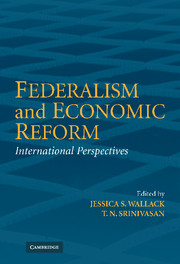Book contents
- Frontmatter
- Contents
- List of Contributors
- Acknowledgments
- 1 Analyzing Federalism: Stylized Models and the Political Economy Reality
- 2 Federalism in Argentina and the Reforms of the 1990s
- 3 Australia: Central Fiscal Dominance, Collaborative Federalism, and Economic Reform
- 4 The Brazilian Federation: Facts, Challenges, and Perspectives
- 5 Changing with the Times: Success, Failure, and Inertia in Canadian Federal Arrangements, 1945–2002
- 6 Fiscal Federalism and Economic Reform in China
- 7 Indian Federalism, Economic Reform, and Globalization
- 8 Mexico's Decentralization at a Crossroads
- 9 Transfer Dependence and Regional Disparities in Nigerian Federalism
- 10 Conclusions and Lessons for Further Study
- Index
- References
10 - Conclusions and Lessons for Further Study
Published online by Cambridge University Press: 25 July 2009
- Frontmatter
- Contents
- List of Contributors
- Acknowledgments
- 1 Analyzing Federalism: Stylized Models and the Political Economy Reality
- 2 Federalism in Argentina and the Reforms of the 1990s
- 3 Australia: Central Fiscal Dominance, Collaborative Federalism, and Economic Reform
- 4 The Brazilian Federation: Facts, Challenges, and Perspectives
- 5 Changing with the Times: Success, Failure, and Inertia in Canadian Federal Arrangements, 1945–2002
- 6 Fiscal Federalism and Economic Reform in China
- 7 Indian Federalism, Economic Reform, and Globalization
- 8 Mexico's Decentralization at a Crossroads
- 9 Transfer Dependence and Regional Disparities in Nigerian Federalism
- 10 Conclusions and Lessons for Further Study
- Index
- References
Summary
INTRODUCTION
What does the division of responsibilities and powers across levels of government – federalism – look like? How did it get to be this way? And how does federalism interact with the economic and political contexts, particularly growing integration with the international economy and ongoing economic reforms?
The chapters of this book seek to answer these three questions for a diverse array of countries. Argentina, Australia, Canada, China, Brazil, India, Mexico, and Nigeria span the full range of economic, political, and social contexts in which federalism currently exists. Nevertheless, there are some striking commonalities in their experiences with federalism.
This concluding chapter compares and contrasts three aspects of the countries' experiences with federalism. First, we discuss the division of expenditure and redistribution responsibilities, as well as taxation powers. The countries had a common tendency toward de facto (though not always de jure) centralization of control over expenditures. There were varying degrees of clarity in the assignment of responsibilities; in many cases, central and subnational government functions were interdependent so that subnational autonomy was limited. Taxation also tends to be fairly centralized in the countries we studied in this project, with subnational governments varying in the extent to which they exploit the tax bases assigned to them. The allocation of tax revenues, in particular whether all taxes were shared or only specific taxes were shared between national and subnational governments, appeared to influence all levels of governments' choice of taxes.
Public sector enterprises also complicated the picture in some countries.
- Type
- Chapter
- Information
- Federalism and Economic ReformInternational Perspectives, pp. 456 - 498Publisher: Cambridge University PressPrint publication year: 2006



